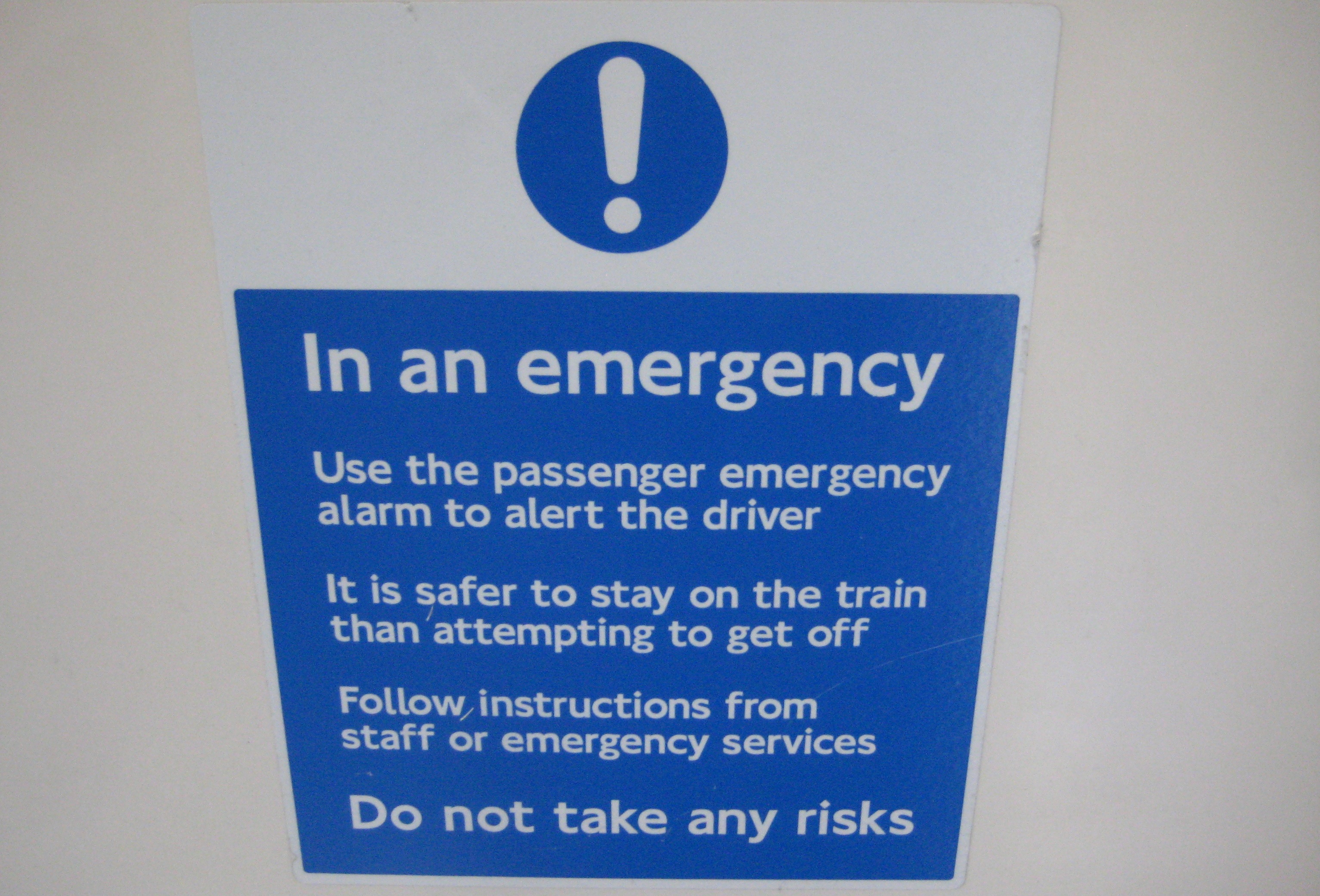The Train Emergency
I snapped this photo in London on the subway [or “the tube” as they call it] last month. I had just jumped onto a packed train and as I squeezed myself in between 10 other people, I found myself face-to-face with this sign:
In an emergency
Use the passenger emergency alarm to alert the driver
It is safer to stay on the train than attempting to get off
Follow instructions from staff or emergency services
Do not take any risks
Something about the photo got my attention and I snapped a picture of it before I got off at my stop, but every single time I rode the tube for the rest of the week, I noticed the sign. I thought about the sign a lot over the last month and it’s actually really great advice for a train emergency.
From a train conductor’s standpoint, they want people to know that an emergency situation could occur at any time and if one does, they want to know about it. They want to make sure everyone stays on the train so they know where to expect them and they want people to follow instructions so things proceed how they want them to. Above all, they don’t want people to take risks, because risks, are unpredictable and the last thing you want in an train emergency is to have people making unpredictable decisions. All in all, this is really good advice for a train emergency, but…
The Life Emergency
I think we treat life a little too much like a train emergency. The advice certainly sounds familiar
- Always be aware that things could go wrong at any moment.
- When they do go wrong, be sure to let everyone know about it.
- Don’t do anything different than what you’re doing right now.
- Listen to people who “know better.”
- Most importantly, don’t take any risks, because that could be dangerous.
All great advice for a train emergency, but terrible advice for life
The Conductor
Just like in emergency situations this approach to life is great for one person: the conductor.
The emergency approach keeps people in fear, or at least conscious of it. When something does happen, the conductor is immediately notified, and nobody moves outside the conductor’s control. Everyone is obedient and orderly and everyone is completely predictable since no one is taking risks. The conductor has complete control over the train, over the masses, over…you.
For the passenger, the emergency approach is 100% hands off. Don’t actually do anything to change your situation, just wait for it to get better. The conductor will handle everything, just wait. Instead of creating your own solutions and marking out your own path, you defer to the conductor for no other reason than that’s what you’re “supposed to do”. So you wait [and we already know how I feel about waiting].
Some Bad Advice
If you want bad advice, here’s some of the worst you can find:
- Worry about an emergency even when there isn’t one.
- When there is one, panic.
- Stay on the train. Don’t think about doing anything different than what you’re doing now.
- Follow instructions from people who “know better”
- Above all, don’t take any risks. Who knows what will happen?
You can go ahead and take that advice, a lot of people do, and that’s okay, everyone gets to choose. But, I see way too many people following “in case of emergency” contingency plans because they’re supposed to, rather than because it’s actually the best decision for them.
This isn’t permission to be reckless with your life and endanger others. Not at all. What this is, is permission to:
- Live fearlessly
- Remain calm in the face of problems
- Get off the train
- Think independently
- Take risks
In case of emergency, take a risk. Even better, take a risk before there’s an emergency on hand and see if you don’t avoid “the emergency” all together.
If you need help with risk taking, my good friend Tyler Tervooren has a whole site dedicated to the fine art of risk taking called Advanced Riskology to help you out on your way.
If you enjoyed this article, please help share it on Facebook, Twitter, or Stumbleupon and lets help more people do something impossible.
[BIT Update – I finally finished the free email course for The League of Impossible Things entitled One Week To Impossible. The first email will go out tomorrow to those of you signed up already [I wanted to give you a heads up]. If you haven’t subscribed yet, you can do so in the sidebar, or fill out this form and you’ll get in on the impossible goodness.]


I love it, dude! Western Culture programs us from birth to avoid risks. You can see it with the rise of helicopter parenting. It continues into young adulthood with more and more people choosing to major in something “safe” like Business at University. And in the US and the UK, we have reams of laws written to “protect us from ourselves”.
People who take risks are less likely to be good, obedient consumers. People who take risks tend to rock the boat and to ask uncomfortable questions. But what society doesn’t seem to realize is that the innovation in science and entrepreneurship that’s gotten us to where we are came from risk-takers. Risk is critical for a well-lived life, as well as for a healthy society…
The uncomfortable questions are usually the ones we need to ask the most.
Mars Dorian shared a quote in the last post – “The reasonable man adapts to the world, the unreasonable man adapts the world to himself. All progress therefore depends upon the unreasonable man!”
I couldn’t agree more.
How poignant and observant, Joel! Human nature oftentimes err on the side of less-to-zero risk taking, due to the very fact that something “could” go wrong. And when they do, people all around will say, “See? Told you so! Why didn’t you just listen and stay put?”
But stay put in life? Be comfortable, but not all that happy, with where we’re at? Bark at changes when they occur — and they always occur — yet don’t even *try* to attempt an understanding of what the change may be and how it can actually be a positive thing?
No, it is not a life when lived as such. I say, ignore the emergency sign (esp. in life) and live according to what makes you come alive and truly happy. 🙂
I don’t understand why it makes sense to “stay on the train” even when things go south.
There’s something to be said for sticking it out through things, but at the same time, if you’ve tried and tested something and it legitimately isn’t working, why keep plodding away at the same thing?
Great point Nina – I wonder why more people aren’t thinking “what could happen if things go right,” instead of constantly looking for stop signs.
Exactly. Like I said, when it comes to risk taking, Tyler is the man. He’s written a whole post on “What happens if everything goes right?.” It’s awesome. You should read it 😉
What a FREAKING AWESOME post Joel!!!
We see stuff like this everyday, read it, process it, digest it, tell ourselves we got it. That’s what keeps most people in the herd mentality. They go through life on “auto-pilot”.
Thanks Maria! Don’t be afraid to step out, try something new and be different. Glad you enjoyed the post.
Great post! I hate to say it, but I’m one of those people who probably would leap off the train and make unpredictable decisions – in a train emergency. So why is it so hard for me to bring my personal “train emergency” attitude over into my life? Go figure 😛
Thanks Jess! It’s funny how we separate our attitudes in different areas of life. One thing that helps is trying to bring your life to be congruent instead of having it compartmentalized. It’s hard and goes against a lot of what we’re “taught” but I’ve found it’s a much better way to go through life.
Bullseye!
You hit it Joel, I have been outside the train for a while now trying to convince others it is about to crash! Its going faster and faster and is running out of track. Thanks for the encouragement that I’m not actually crazy.
JSJ
You’re not crazy =)
Welcome to life off the train.
Well, some people would just ignore that sign, not aware of how important it really is, but you took the time to understand it and create an analogy of it in real life. Emergencies do happen and and this is really great advice to follow when you find yourself in one.
Thanks Andrew. Glad it helps!
I live my life out side the box,I’m never sure what tomorrow will bring. Having cancer9 years ago taught me to never take anything for granted and to follow those whims, i now have an autistic child and have acquired a very large dog in the last few day….why? Why not I like dogs, dogs like me. After my spouse left i took the kids to live on a farm for a year, for a different experience and boy did we have them, we had everything from learning when and when not to ford flooded creeks in a 4WD, advoiding Kangaroos, wombats and huge lizards and why ABS breaks suck when you live on a dirt road.
I could go on, but i like the point you make, live is for living, not worrying about what might kill you everytime you step out your front door.
Kudos to a live well lived and keep up the excellent posts.
Regards
Dani
Good job making the best of the situation Dani. I think your kids probably had a great time. Keep enjoying life and living well in spite of what life throws at you 🙂
I read this early this morning and then just as I was driving to work drove past a guy who looks exactly like you. Unless you lie on the Sunshine Coast it probably wasn’t you, but it reinforced your words back into my consciousness which I will carry through with me today t work. I completely agree, live life without fear of restrictions!
Kia
X